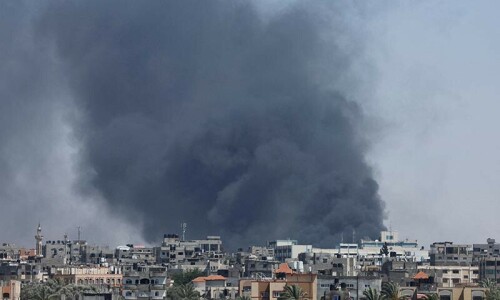ISLAMABAD: The case of 35 persons, who went missing from an army detention facility in Khyber Pakhtunkhwa, reared its head again in the Supreme Court on Wednesday when the federal government submitted a statement suggesting that the main accused — a junior army officer — would be court-martialled under the Pakistan Army Act (PAA) 1952.
At the last hearing, the court was told that an FIR had been registered against Naib Subedar Amanullah Baig and others — who were posted at the army’s internment centre in Malakand Fort — for removing 35 individuals from the detention facility. The case was registered under Section 346 of the Pakistan Penal Code (PPC), which deals with wrongful confinement in a secret place.
Subsequently the court ordered the federal and provincial governments to ensure diligent and transparent investigation, instructing them to add charges under whichever sections of the PPC they deemed necessary to be included in the case.
But when the case was taken up again by a three-judge bench, headed by Justice Jawwad S. Khawaja, Deputy Attorney General Waqas Dar submitted a one-page statement on behalf of the defence ministry, informing the court that the main accused was a serving member of the armed forces and subject to punishment under the PAA.
The court had taken up this matter to ensure compliance with its verdict of Dec 10 in the case of missing person Yasin Shah, initiated on the application of his brother Muhabbat Shah. In the verdict, the court held the army responsible for removing 35 persons from the Malakand internment centre.
In accordance with the court’s directions, the statement explained, the Malakand DCO was approached to settle the criminal case against the soldier, registered at the Malakand Levy Post. Jurisdiction over the accused was then shifted to army authorities for investigation and trial under the army act.
This revelation seemed to come as a bolt out of the blue for the bench, prompting Justice Khawaja to observe, “This amounts to closing the case”.
“Could Amanullah move the missing persons from the internment centre without approval,” he asked, adding that the court had heard a similar case of one Tasif Ali alias Danish. There, the judge said, it was held that civilian authorities have a right to investigate the matter once an FIR is registered.
Justice Khawaja said the court would seek assistance from Attorney General Salman Aslam Butt in deciding the matter and adjourned the case to next week.
In a statement, which was sent to the AG office, the defence ministry said: “The competent military authority under Section 94 of the PAA, Section 549 of the Criminal Procedure Code (CrPC) and Rule 373 of the Army Regulations read with Pakistan Army Act (Rule) 168 has taken due cognizance of the case and has decided that the accused be dealt with under PAA.”
An inquiry had already been ordered, the statement said, on March 10. The outcome of investigation and any action taken in the case against the accused would be communicated, for police record, in due course in the light of Rule 374 of army regulations, the communiqué explained.












































Dear visitor, the comments section is undergoing an overhaul and will return soon.